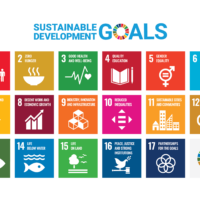How companies can stabilize the patient called planet Earth
With the Earth well outside the safe operating space for humanity, according to a new report, here’s how companies can take action. ...
15 November 2021 • by Christos Cabolis, Karl Schmedders in Competitiveness
On the heels of the COP 26 UN Climate Change Conference there is global buzz about ESG goals, but many gaps remain between companies’ talk and their actions. ...
On the heels of the COP 26 UN Climate Change Conference there is global buzz about ESG goals, but many gaps remain between companies’ talk and their actions. Indeed, nearly half the executives who participated in our IMD webinar indicated they agreed with Greta Thunberg that “the COP 26 conference is just a big PR event”, or believed the goal of reducing temperature increases to 1.5°C by mid-century was on “life support”, as expressed by Antonio Guterres.
To avoid greenwashing and begin seeing real, measurable results we need to first fully understand the relationship between the E, the S and the G when we are discussing and setting our companies’ ESG goals.
E: Environmental: Considerations might include climate change mitigation and adaptation, as well as the environment more broadly, for instance the preservation of biodiversity, pollution prevention, and the circular economy.
S: Social: Considerations could refer to inequality, inclusiveness, labor relations, investment in human capital and communities, as well as human rights issues.
G: Governance: This refers to both public and private institutions, including management structures, employee relations, and executive remuneration. It plays a fundamental role in ensuring the inclusion of social and environmental considerations in the decision-making process.
In the broad discussion of these goals, social considerations are often the forgotten stepchild. People focus on the environmental concerns and how corporate governance can influence change or is failing to do so. But rarely do people look at the relationship between environmental and social concerns. In fact, more than two-thirds of participants in our IMD webinar indicated they believed there was a positive correlation between environment goals and social objectives. However, the opposite is often true.
Consider the yellow jacket protests in Paris. These demonstrations were sparked when carbon taxes were imposed on the French public. While the intent was to motivate people to change their behavior, the burden disproportionately affected low-wage workers who lived outside of Paris and relied on their cars to drive in and earn their livelihoods. These problems occur when we do not consider the social impact of environmental incentives, which often present differently for different socioeconomic groups. When you consider people who live from pay check to pay check, or even day to day, the choice between putting food on the table or doing the environmentally correct thing is clear.
Greenwashing is a term making its way more frequently into public discussion, because many companies are being exposed for making statements they simply don’t live up to. It is easy for a corporation to pledge to be carbon zero in 30 years because, frankly, the people saying that will likely be long retired by then. There is no accountability built into a lot of plans that are presented to the public. But even when the public gets upset about it, the incentive for accountability isn’t there.
One of the fundamental problems in getting businesses to change their behaviors is that the transition to a more environmentally sensitive world comes at a cost. ESG initiatives have a cost attached to them, which means lower profits. So what can be done to get companies to change?
Incentives are needed to change peoples’ behavior. This means regulation at the government level as well as the corporate level. Recent studies have indicated that more than 90% of companies don’t link compensation to ESG objectives. Tying a percentage of C-Suite compensation to hitting goals would be an effective way to ensure ESG goals are taken seriously.
Finally, we need to establish some metrics by which to measure the impact of ESG initiatives, because without measures to hold people accountable greenwashing is all too easy.

Chief Economist at the IMD World Competitiveness Center
Christos Cabolis is the IMD World Competitiveness Center’s Chief Economist and Head of Operations and Adjunct Professor of Economics and Competitiveness at IMD. His research focuses on competitiveness in its broadest sense, such as the challenges inherent to ESG and the need to respect citizens’ privacy in an increasingly digitalized world.

Professor of Finance at IMD
Karl Schmedders is Professor of Finance at IMD. In his research, he applies numerical solution techniques to complex economic and financial models, shedding light on relevant market issues and industry problems. He is also Director of IMD’s new online certification course for structured investment products in partnership with Swiss company Leonteq, teaches in the Advanced Management Concepts (AMC) and Executive MBA programs, and is an advisor on International Consulting Projects in the MBA program.

17 September 2023 • by Julia Binder in Sustainability • 9 min read
With the Earth well outside the safe operating space for humanity, according to a new report, here’s how companies can take action. ...

15 September 2023 • by Amanda Williams in Sustainability • 6 min read
While the rosy optimism that greeted the UN Sustainable Development Goals when they were first launched in 2015 may have faded, I have tracked some cross-sector and private-sector progress that’s really making...
14 September 2023 • by Knut Haanaes, Bryony Jansen van Tuyll in Sustainability • 10 min read
Using the ‘Future Back’ tool can set your organization on the path to a successful sustainable business transformation. Knut Haanaes and Bryony Jansen-van Tuyll outline three practical steps to achieve lasting results....
 Audio available
Audio available
6 September 2023 • by Karl Schmedders, Jerome Cochet, Ricarda Röller, Angelika Schmid, Philipp Müller in Sustainability • 6 min read
In the second in a series of articles looking at the carbon market, the authors explore how the use of blockchain technology could not only keep the voluntary carbon market honest and...
22 August 2023 • by Jim Pulcrano in Sustainability • 3 min read
With investors increasingly focusing on ESG topics, you might think that being a Tech for Good company would help attract funding. This is not always the case, says Marc Gitzinger, CEO of...
22 August 2023 • by Jim Pulcrano in Sustainability • 4 min read
Frustrated by the limitations of using technology to do good in the non-profit sector, Lotta Relander decided to found Grownate, a digital platform that helps corporates and brands connect with their customers...

21 August 2023 • by Karl Schmedders in Sustainability • 7 min read
As the world enters a new era of “global boiling”, how can businesses mitigate the economic and operational challenges posed by increasingly severe and frequent extreme weather events? ...

16 August 2023 • by Calimna Sladic in Sustainability • 8 min read
Growing up in the sunny south of France, I had the chance to be in nature pretty much every day. Access to nature was normal to me. The experiences of one of...
Explore first person business intelligence from top minds curated for a global executive audience